Deck 11: Functions and Relations
Question
Question
Question
Question
Question
Question
Question
Question
Question
Question
Question
Question
Question
Question
Question
Question
Question
Question
Question
Question
Question
Question
Question
Question
Question
Question
Question
Question
Question
Question
Question
Question
Question
Question
Question
Question
Question
Question
Question
Question
Question
Question
Question
Question
Question
Question
Question
Question
Question
Question
Question
Question
Question
Question
Question
Question
Question
Question
Question
Question
Question
Question

Unlock Deck
Sign up to unlock the cards in this deck!
Unlock Deck
Unlock Deck
1/62
Play
Full screen (f)
Deck 11: Functions and Relations
1
Find the zeros of the function: 
A)
B)
C)
D)
E)

A)

B)

C)

D)

E)


2
Use the discriminant to determine the number of x-intercepts of the graph: 
A) None
B) Two
C) One

A) None
B) Two
C) One
Two
3
Use the discriminant to determine the number of x-intercepts of the graph: 
A) None
B) Two
C) One

A) None
B) Two
C) One
None
4
Find the x-intercepts of the parabola: 
A) (0,-3),
B) (0,-3),
C) (-3,0),
D) (3,0),
E) No x-intercepts

A) (0,-3),

B) (0,-3),

C) (-3,0),

D) (3,0),

E) No x-intercepts

Unlock Deck
Unlock for access to all 62 flashcards in this deck.
Unlock Deck
k this deck
5
Find the x-intercepts of the parabola: 
A) (0,8),
B) (0,8),
C) (-8,0),
D) (8,0),
E) No x-intercepts

A) (0,8),

B) (0,8),

C) (-8,0),

D) (8,0),

E) No x-intercepts

Unlock Deck
Unlock for access to all 62 flashcards in this deck.
Unlock Deck
k this deck
6
Find the vertex and axis of symmetry, and then graph the parabola given by: 
A) Vertex: ( ); Axis of symmetry: x =
); Axis of symmetry: x = 
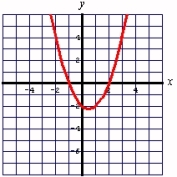
B) Vertex: ( ); Axis of symmetry: x =
); Axis of symmetry: x = 
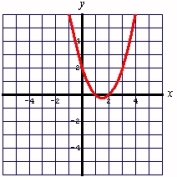
C) Vertex: ( ) ; Axis of symmetry: x =
) ; Axis of symmetry: x = 
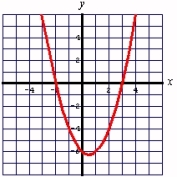

A) Vertex: (
 ); Axis of symmetry: x =
); Axis of symmetry: x = 

B) Vertex: (
 ); Axis of symmetry: x =
); Axis of symmetry: x = 

C) Vertex: (
 ) ; Axis of symmetry: x =
) ; Axis of symmetry: x = 


Unlock Deck
Unlock for access to all 62 flashcards in this deck.
Unlock Deck
k this deck
7
State the domain and range of the function: 
A) Domain:
Range:
B) Domain:
Range:
C) Domain:
Range:
D) Domain:
Range:
E) Domain:
Range:

A) Domain:

Range:

B) Domain:

Range:

C) Domain:

Range:

D) Domain:

Range:

E) Domain:

Range:


Unlock Deck
Unlock for access to all 62 flashcards in this deck.
Unlock Deck
k this deck
8
State the domain and range of the function: 
A) Domain:
Range:
B) Domain:
Range:
C) Domain:
Range:
D) Domain:
Range:
E) Domain:
Range:

A) Domain:

Range:

B) Domain:

Range:

C) Domain:

Range:

D) Domain:

Range:

E) Domain:

Range:


Unlock Deck
Unlock for access to all 62 flashcards in this deck.
Unlock Deck
k this deck
9
Find the x-intercepts of the parabola: 
A) (3,0)
B) (3,0), (-2,0)
C) (0,-3), (3,0)
D) (0,-3), (0,3)
E) (-3,0), (3,0)

A) (3,0)
B) (3,0), (-2,0)
C) (0,-3), (3,0)
D) (0,-3), (0,3)
E) (-3,0), (3,0)

Unlock Deck
Unlock for access to all 62 flashcards in this deck.
Unlock Deck
k this deck
10
Find the vertex and axis of symmetry, and then graph the parabola given by: 
A) Vertex: (2, -1); Axis of symmetry: x = 2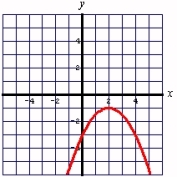
B) Vertex: (2, -1); Axis of symmetry: x = 2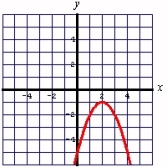
C) Vertex: (1, -1); Axis of symmetry: x = 1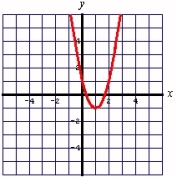

A) Vertex: (2, -1); Axis of symmetry: x = 2

B) Vertex: (2, -1); Axis of symmetry: x = 2

C) Vertex: (1, -1); Axis of symmetry: x = 1


Unlock Deck
Unlock for access to all 62 flashcards in this deck.
Unlock Deck
k this deck
11
Find the zeros of the function: 
A) -4, -8
B) ,
, 
C) ,
, 
D) -4, 8
E) ,
, 

A) -4, -8
B)
 ,
, 
C)
 ,
, 
D) -4, 8
E)
 ,
, 

Unlock Deck
Unlock for access to all 62 flashcards in this deck.
Unlock Deck
k this deck
12
Find the x-intercepts of the parabola: 
A) (0,-1), (0,3)
B) (0,-1), (3, 0)
C) (1,0), (3,0)
D) (1, 3)
E) (-1,0), (3, 0)

A) (0,-1), (0,3)
B) (0,-1), (3, 0)
C) (1,0), (3,0)
D) (1, 3)
E) (-1,0), (3, 0)

Unlock Deck
Unlock for access to all 62 flashcards in this deck.
Unlock Deck
k this deck
13
Find the vertex and axis of symmetry, and then graph the parabola given by: 
A) Vertex: (2, -1); Axis of symmetry: x = 2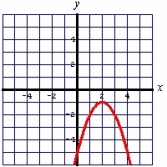
B) Vertex: (-2, -8); Axis of symmetry: x = -2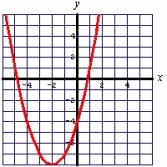
C) Vertex: (1, -2); Axis of symmetry: x = 1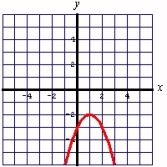

A) Vertex: (2, -1); Axis of symmetry: x = 2

B) Vertex: (-2, -8); Axis of symmetry: x = -2

C) Vertex: (1, -2); Axis of symmetry: x = 1


Unlock Deck
Unlock for access to all 62 flashcards in this deck.
Unlock Deck
k this deck
14
Find the zeros of the function: 
A) 0, 3
B)
C)
D) 0, 2
E)

A) 0, 3
B)

C)

D) 0, 2
E)


Unlock Deck
Unlock for access to all 62 flashcards in this deck.
Unlock Deck
k this deck
15
Find the zeros of the function: 
A) 4, 0
B) -4, 0
C) -4, 8
D) -4, -8
E) 4, 8

A) 4, 0
B) -4, 0
C) -4, 8
D) -4, -8
E) 4, 8

Unlock Deck
Unlock for access to all 62 flashcards in this deck.
Unlock Deck
k this deck
16
Find the zeros of the function: 
A)
B)
C)
D) 0, 3
E) 0, 2

A)

B)

C)

D) 0, 3
E) 0, 2

Unlock Deck
Unlock for access to all 62 flashcards in this deck.
Unlock Deck
k this deck
17
Find the zeros of the function: 
A)
B)
C)
D)
E) 0, 8

A)

B)

C)

D)

E) 0, 8

Unlock Deck
Unlock for access to all 62 flashcards in this deck.
Unlock Deck
k this deck
18
Use the discriminant to determine the number of x-intercepts of the graph: 
A) One
B) Two
C) None

A) One
B) Two
C) None

Unlock Deck
Unlock for access to all 62 flashcards in this deck.
Unlock Deck
k this deck
19
Find the x-intercepts of the parabola: 
A) No x-intercepts
B) (-4,0),
C) (0,-4),
D) (0,-4),
E) (4,0),

A) No x-intercepts
B) (-4,0),

C) (0,-4),

D) (0,-4),

E) (4,0),


Unlock Deck
Unlock for access to all 62 flashcards in this deck.
Unlock Deck
k this deck
20
Find the x-intercepts of the parabola: 
A) (-2,0),
B) (0,-2),
C)
D) (0,-2),
E) (2,0),

A) (-2,0),

B) (0,-2),

C)

D) (0,-2),

E) (2,0),


Unlock Deck
Unlock for access to all 62 flashcards in this deck.
Unlock Deck
k this deck
21
Given the graph of  . Use translations to draw the graphs
. Use translations to draw the graphs  .
. 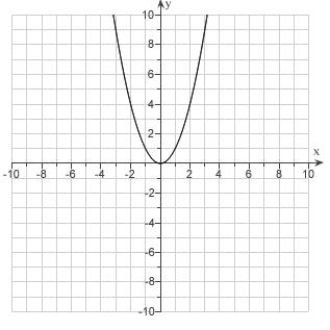
A)
B)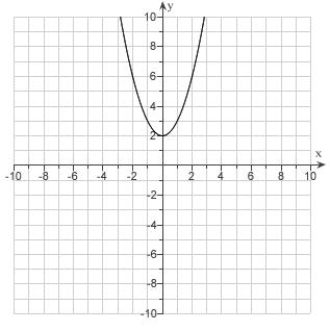
C)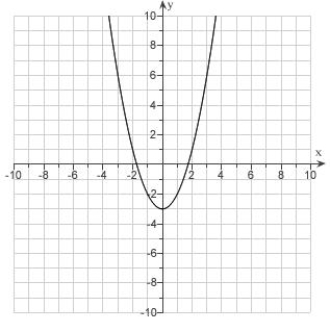
D)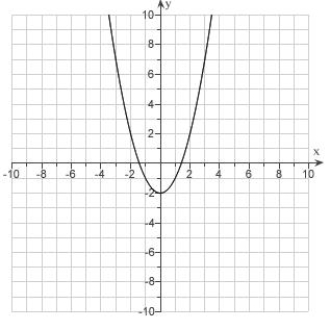
E)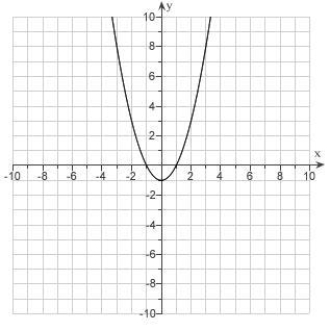
 . Use translations to draw the graphs
. Use translations to draw the graphs  .
. 
A)

B)

C)

D)

E)


Unlock Deck
Unlock for access to all 62 flashcards in this deck.
Unlock Deck
k this deck
22
Find the minimum or maximum of the quadratic function: 
A) Minimum: 5
B) Maximum: -3
C) Minimum: 1
D) Minimum: 11
E) Minimum: 3

A) Minimum: 5
B) Maximum: -3
C) Minimum: 1
D) Minimum: 11
E) Minimum: 3

Unlock Deck
Unlock for access to all 62 flashcards in this deck.
Unlock Deck
k this deck
23
The height, s, in feet, of a rock thrown upward at an initial speed of 76 ft/s from a cliff 40 ft above the ocean beach is given by the function  where t is the time in seconds. Find the maximum height above the beach that the rock will attain.
where t is the time in seconds. Find the maximum height above the beach that the rock will attain.
A) 2.4 ft
B) 122.25 ft
C) 130.25 ft
D) 134.25 ft
E) 130 ft
 where t is the time in seconds. Find the maximum height above the beach that the rock will attain.
where t is the time in seconds. Find the maximum height above the beach that the rock will attain.A) 2.4 ft
B) 122.25 ft
C) 130.25 ft
D) 134.25 ft
E) 130 ft

Unlock Deck
Unlock for access to all 62 flashcards in this deck.
Unlock Deck
k this deck
24
Use the discriminant to determine the number of x-intercepts of the graph: 
A) One
B) Two
C) None

A) One
B) Two
C) None

Unlock Deck
Unlock for access to all 62 flashcards in this deck.
Unlock Deck
k this deck
25
Find the minimum or maximum of the quadratic function: 
A) Minimum: -5
B) Minimum: 10
C) Minimum: -10
D) Maximum: -2
E) Maximum: 8

A) Minimum: -5
B) Minimum: 10
C) Minimum: -10
D) Maximum: -2
E) Maximum: 8

Unlock Deck
Unlock for access to all 62 flashcards in this deck.
Unlock Deck
k this deck
26
Find two numbers whose difference is 46 and whose product is a minimum.
A) 23, -23
B) -23, -69
C) -25, -71
D) 33, -13
E) 26, -20
A) 23, -23
B) -23, -69
C) -25, -71
D) 33, -13
E) 26, -20

Unlock Deck
Unlock for access to all 62 flashcards in this deck.
Unlock Deck
k this deck
27
Find the minimum or maximum of the quadratic function: 
A) Minimum: 3.5
B) Minimum: 0.25
C) Minimum: -0.25
D) Minimum: 2.5
E) Minimum: -3.5

A) Minimum: 3.5
B) Minimum: 0.25
C) Minimum: -0.25
D) Minimum: 2.5
E) Minimum: -3.5

Unlock Deck
Unlock for access to all 62 flashcards in this deck.
Unlock Deck
k this deck
28
A tour operator believes the profit P, in dollars, from selling x tickets is given by  Using this model, what is the maximum profit the tour operator can expect?
Using this model, what is the maximum profit the tour operator can expect?
A) $6912
B) $96
C) $2304
D) $2303
E) $2300
 Using this model, what is the maximum profit the tour operator can expect?
Using this model, what is the maximum profit the tour operator can expect?A) $6912
B) $96
C) $2304
D) $2303
E) $2300

Unlock Deck
Unlock for access to all 62 flashcards in this deck.
Unlock Deck
k this deck
29
A manufacturer of microwave ovens believes that the revenue R, in dollars, the company receives is related to the price P, in dollars, of an oven by the function  What price will give the maximum revenue?
What price will give the maximum revenue?
A) $15,125
B) $266
C) $270
D) $550
E) $275
 What price will give the maximum revenue?
What price will give the maximum revenue?A) $15,125
B) $266
C) $270
D) $550
E) $275

Unlock Deck
Unlock for access to all 62 flashcards in this deck.
Unlock Deck
k this deck
30
Given the graph of  . Use reflections to draw the graphs
. Use reflections to draw the graphs  .
. 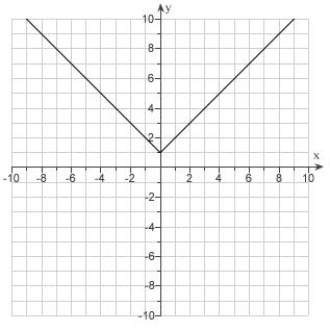
A)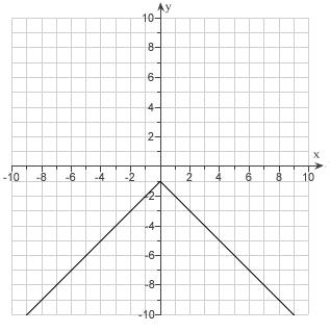
B)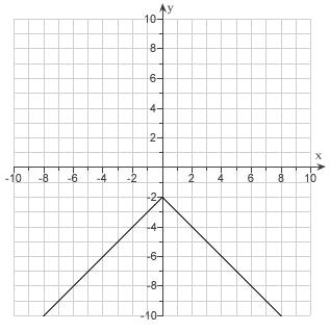
C)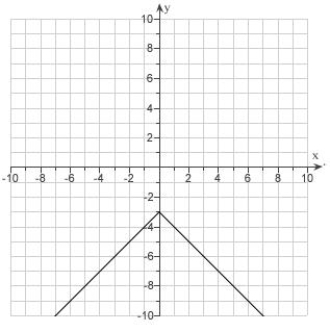
D)
E)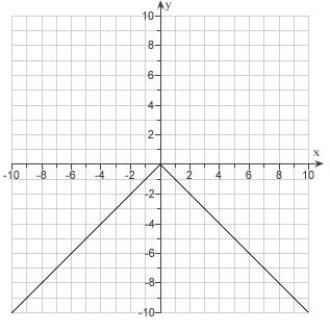
 . Use reflections to draw the graphs
. Use reflections to draw the graphs  .
. 
A)

B)

C)

D)

E)


Unlock Deck
Unlock for access to all 62 flashcards in this deck.
Unlock Deck
k this deck
31
Find the minimum or maximum of the quadratic function: 
A) Maximum: 18
B) Maximum: -6
C) Minimum: -14
D) Minimum: 4
E) Minimum: 14

A) Maximum: 18
B) Maximum: -6
C) Minimum: -14
D) Minimum: 4
E) Minimum: 14

Unlock Deck
Unlock for access to all 62 flashcards in this deck.
Unlock Deck
k this deck
32
Let  Find:
Find: 
A) -11
B) -5
C)
D)
E)
 Find:
Find: 
A) -11
B) -5
C)

D)

E)


Unlock Deck
Unlock for access to all 62 flashcards in this deck.
Unlock Deck
k this deck
33
Given the graph of  called a sawtooth wave. Use translations to draw the graphs
called a sawtooth wave. Use translations to draw the graphs  .
. 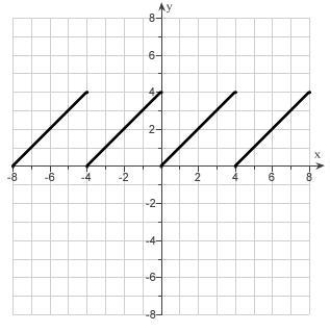
A)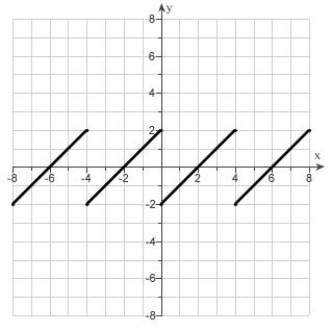
B)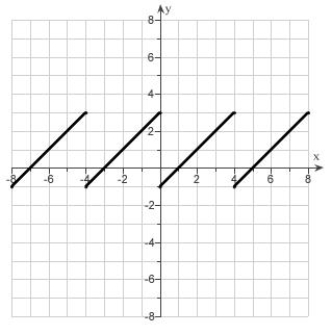
C)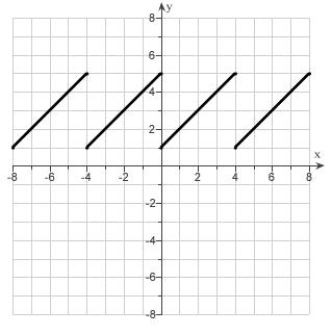
D)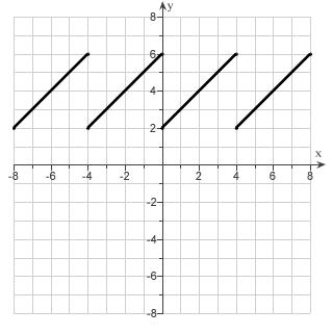
E)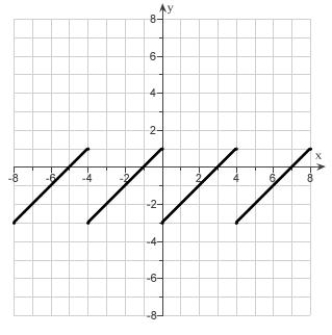
 called a sawtooth wave. Use translations to draw the graphs
called a sawtooth wave. Use translations to draw the graphs  .
. 
A)

B)

C)

D)

E)


Unlock Deck
Unlock for access to all 62 flashcards in this deck.
Unlock Deck
k this deck
34
Let  Find:
Find: 
A) 72
B) 1232
C) -164
D) -260
E) 2348
 Find:
Find: 
A) 72
B) 1232
C) -164
D) -260
E) 2348

Unlock Deck
Unlock for access to all 62 flashcards in this deck.
Unlock Deck
k this deck
35
Find the minimum or maximum of the quadratic function: 
A) Minimum: -1
B) Minimum: 5
C) Minimum: 4
D) Minimum: -4
E) Minimum: 12

A) Minimum: -1
B) Minimum: 5
C) Minimum: 4
D) Minimum: -4
E) Minimum: 12

Unlock Deck
Unlock for access to all 62 flashcards in this deck.
Unlock Deck
k this deck
36
Let  Find:
Find: 
A) -64
B) -70
C) -52
D) -76
E) -32
 Find:
Find: 
A) -64
B) -70
C) -52
D) -76
E) -32

Unlock Deck
Unlock for access to all 62 flashcards in this deck.
Unlock Deck
k this deck
37
Given the graph of  . Use translations to draw the graphs
. Use translations to draw the graphs  .
. 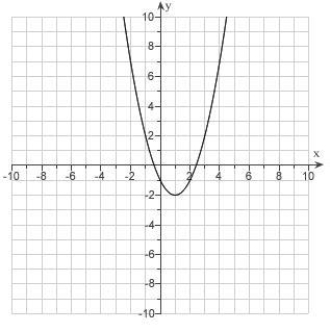
A)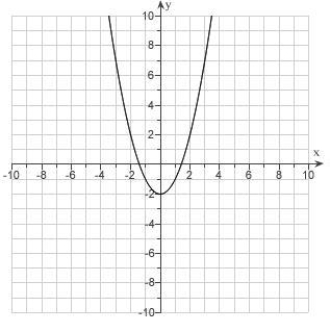
B)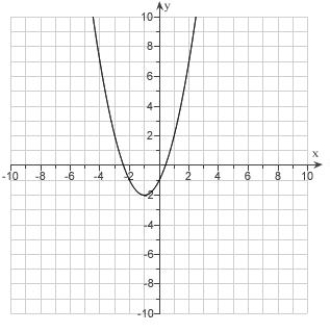
C)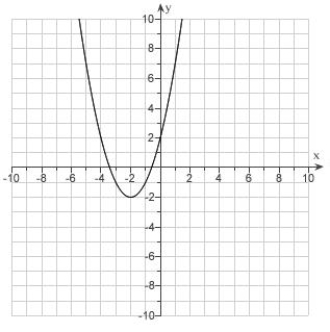
D)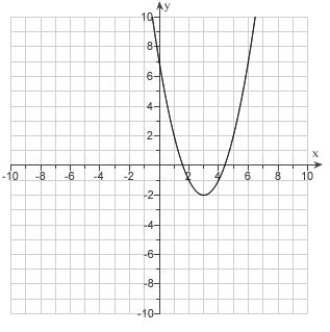
E)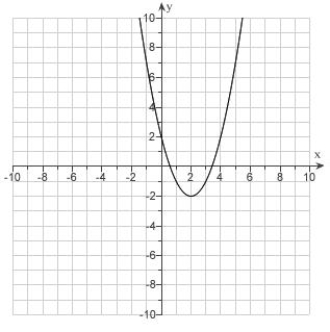
 . Use translations to draw the graphs
. Use translations to draw the graphs  .
. 
A)

B)

C)

D)

E)


Unlock Deck
Unlock for access to all 62 flashcards in this deck.
Unlock Deck
k this deck
38
Given the graph of  . Use translations to draw the graphs
. Use translations to draw the graphs  .
. 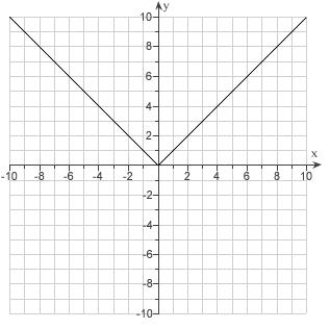
A)
B)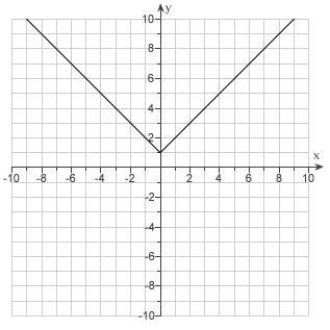
C)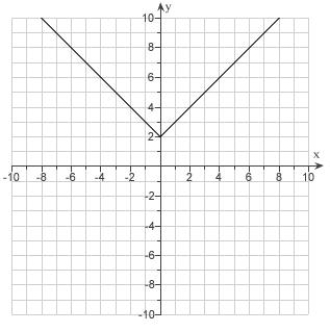
D)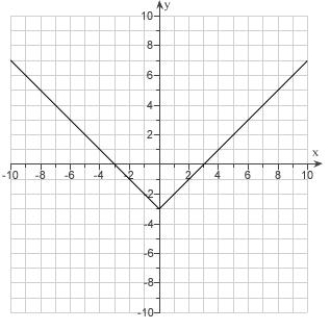
E)
 . Use translations to draw the graphs
. Use translations to draw the graphs  .
. 
A)

B)

C)

D)

E)


Unlock Deck
Unlock for access to all 62 flashcards in this deck.
Unlock Deck
k this deck
39
Find two numbers whose sum is 38 and whose product is a maximum.
A) 30; 8
B) 19; 19
C) 22; 16
D) 13; 25
E) 23; 15
A) 30; 8
B) 19; 19
C) 22; 16
D) 13; 25
E) 23; 15

Unlock Deck
Unlock for access to all 62 flashcards in this deck.
Unlock Deck
k this deck
40
Use the discriminant to determine the number of x-intercepts of the graph: 
A) None
B) Two
C) One

A) None
B) Two
C) One

Unlock Deck
Unlock for access to all 62 flashcards in this deck.
Unlock Deck
k this deck
41
Let  Find:
Find: 
A) 22
B) 10
C) -2
D) -7
E) -1
 Find:
Find: 
A) 22
B) 10
C) -2
D) -7
E) -1

Unlock Deck
Unlock for access to all 62 flashcards in this deck.
Unlock Deck
k this deck
42
Let  Find
Find 
A)
B)
C)
D)
E)
 Find
Find 
A)

B)

C)

D)

E)


Unlock Deck
Unlock for access to all 62 flashcards in this deck.
Unlock Deck
k this deck
43
Let  Find:
Find: 
A) 3
B) -1
C) -4
D) -3
E) -2
 Find:
Find: 
A) 3
B) -1
C) -4
D) -3
E) -2

Unlock Deck
Unlock for access to all 62 flashcards in this deck.
Unlock Deck
k this deck
44
Determine whether the function given below has an inverse. 
A) Inverse exists
B) No inverse

A) Inverse exists
B) No inverse

Unlock Deck
Unlock for access to all 62 flashcards in this deck.
Unlock Deck
k this deck
45
Use the Composition of Inverse Function Property to determine whether the functions given below are inverses. 
A) No
B) Yes

A) No
B) Yes

Unlock Deck
Unlock for access to all 62 flashcards in this deck.
Unlock Deck
k this deck
46
Find  .
. 
A)
B) No inverse
C)
D)
E)
 .
. 
A)

B) No inverse
C)

D)

E)


Unlock Deck
Unlock for access to all 62 flashcards in this deck.
Unlock Deck
k this deck
47
Suppose the spread of an oil leak from a tanker can be approximated by a circle with the tanker at its center and radius r, in feet. The radius of the spill t hours after the beginning of the leak is given by  Find the area of the spill as a function of time.
Find the area of the spill as a function of time.
A)
B)
C)
D)
E)
 Find the area of the spill as a function of time.
Find the area of the spill as a function of time.A)

B)

C)

D)

E)


Unlock Deck
Unlock for access to all 62 flashcards in this deck.
Unlock Deck
k this deck
48
Suppose the spread of an oil leak from a tanker can be approximated by a circle with the tanker at its center and radius r, in feet. The radius of the spill t hours after the beginning of the leak is given by  Find the area of the spill after 3 h. Round to the nearest whole number.
Find the area of the spill after 3 h. Round to the nearest whole number.
A) 38,708 ft2
B) 38,785 ft2
C) 12,321 ft2
D) 1046 ft2
E) 697 ft2
 Find the area of the spill after 3 h. Round to the nearest whole number.
Find the area of the spill after 3 h. Round to the nearest whole number.A) 38,708 ft2
B) 38,785 ft2
C) 12,321 ft2
D) 1046 ft2
E) 697 ft2

Unlock Deck
Unlock for access to all 62 flashcards in this deck.
Unlock Deck
k this deck
49
Find 

A)
B)
C)
D) No inverse
E)


A)

B)

C)

D) No inverse
E)


Unlock Deck
Unlock for access to all 62 flashcards in this deck.
Unlock Deck
k this deck
50
Find  .
. 
A)
B)
C) No inverse
D)
E)
 .
. 
A)

B)

C) No inverse
D)

E)


Unlock Deck
Unlock for access to all 62 flashcards in this deck.
Unlock Deck
k this deck
51
Determine whether the graph shown below is the graph of a 1-1 function. 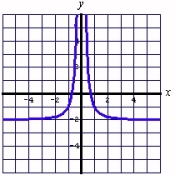
A) Yes
B) No

A) Yes
B) No

Unlock Deck
Unlock for access to all 62 flashcards in this deck.
Unlock Deck
k this deck
52
Find  .
. 
A)
B)
C)
D) No inverse
E)
 .
. 
A)

B)

C)

D) No inverse
E)


Unlock Deck
Unlock for access to all 62 flashcards in this deck.
Unlock Deck
k this deck
53
Let  Find:
Find: 
A) -69
B) -70
C) -65
D) -61
E) -25
 Find:
Find: 
A) -69
B) -70
C) -65
D) -61
E) -25

Unlock Deck
Unlock for access to all 62 flashcards in this deck.
Unlock Deck
k this deck
54
Let  Find:
Find: 
A) -12
B) -2
C) -42
D) -26
E) 28
 Find:
Find: 
A) -12
B) -2
C) -42
D) -26
E) 28

Unlock Deck
Unlock for access to all 62 flashcards in this deck.
Unlock Deck
k this deck
55
Use the Composition of Inverse Function Property to determine whether the functions given below are inverses. 
A) Yes
B) No

A) Yes
B) No

Unlock Deck
Unlock for access to all 62 flashcards in this deck.
Unlock Deck
k this deck
56
Determine whether the graph shown below is the graph of a 1-1 function. 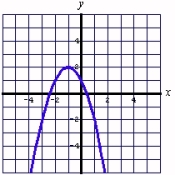
A) Yes
B) No

A) Yes
B) No

Unlock Deck
Unlock for access to all 62 flashcards in this deck.
Unlock Deck
k this deck
57
Let  Find:
Find: 
A) 56
B) 191
C) 193
D) 156
E) 183
 Find:
Find: 
A) 56
B) 191
C) 193
D) 156
E) 183

Unlock Deck
Unlock for access to all 62 flashcards in this deck.
Unlock Deck
k this deck
58
Let  Find
Find 
A)
B)
C)
D)
E)
 Find
Find 
A)

B)

C)

D)

E)


Unlock Deck
Unlock for access to all 62 flashcards in this deck.
Unlock Deck
k this deck
59
Let  Find
Find 
A)
B)
C)
D)
E)
 Find
Find 
A)

B)

C)

D)

E)


Unlock Deck
Unlock for access to all 62 flashcards in this deck.
Unlock Deck
k this deck
60
Determine whether the function given below has an inverse. 
A) No Inverse
B) Inverse exists

A) No Inverse
B) Inverse exists

Unlock Deck
Unlock for access to all 62 flashcards in this deck.
Unlock Deck
k this deck
61
Use the Composition of Inverse Function Property to determine whether the functions given below are inverses. 
A) No
B) Yes

A) No
B) Yes

Unlock Deck
Unlock for access to all 62 flashcards in this deck.
Unlock Deck
k this deck
62
Use the Composition of Inverse Function Property to determine whether the functions given below are inverses. 
A) Yes
B) No

A) Yes
B) No

Unlock Deck
Unlock for access to all 62 flashcards in this deck.
Unlock Deck
k this deck



